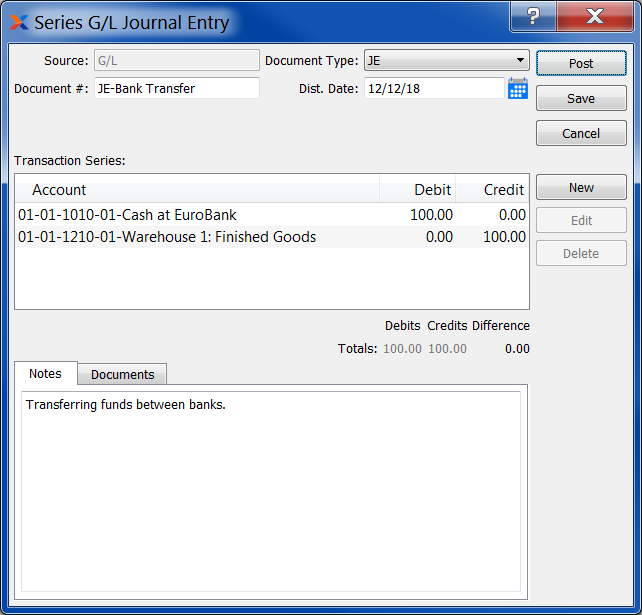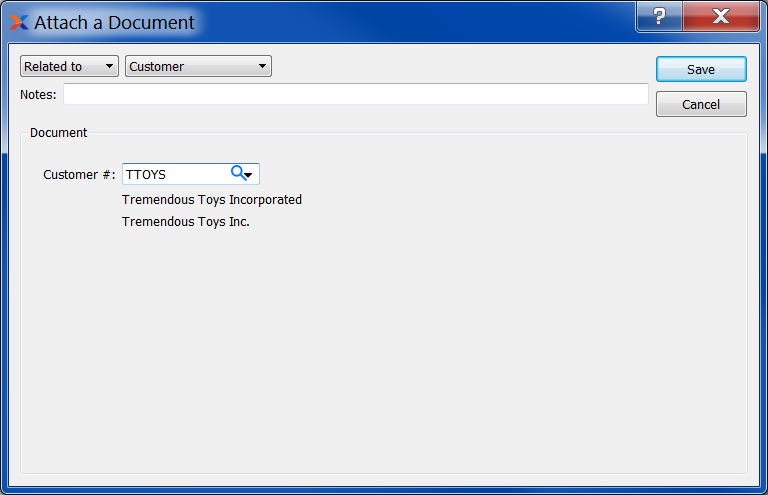
|
xTuple ERP Reference Guide |
To create a series of G/L transactions, go to . The following screen will appear:

When creating a series of G/L transactions, you are presented with the following options:
Series entries are always summary posted. In other words, if multiple entries are made for the same account number, the balance or summary of these entries will be posted—not each individual entry.
Displays the source module for the transaction. By default this value will be G/L.
Enter a document number to identify the transaction series.
Specify a transaction type for classifying the series. By default, the journal entry (JE) transaction type will be used. However, you may select a different transaction type from the list. For explanations about the available transaction types, see Section 1, “ Inventory Transaction Codes”.
Specify the date when you want the transaction series to be posted to the general ledger.
Display lists transactions in the transaction series.
Displays total debits associated with the series. Totals will display in red if debits and credits do not balance.
Displays total credits associated with the series. Totals will display in red if debits and credits do not balance.
Displays the difference between total debits and credits.
This is a scrolling text field with word-wrapping for entering notes related to the transaction series. This may be a required field, depending on your system configuration.
Your system may be configured to require notes whenever manual journal entries are posted.
To add documents to the G/L journal entry series, select the Documents tab.
When associating documents, you are presented with the following options:
Select to create a new document and associate it with the current record. You may create the following document types:
Select to create a new image association.
Select to create a new fixed asset association.
Select to create a new maintenance order association.
Select to create a new incident and associate it.
Select to create a new project and associate it.
Select to create a new opportunity and associate it.
Select to create a new to-do and associate it.
Enables you to edit associated documents. The Edit screen is the same as that for creating a new document—except that when editing, the fields will contain document information. Double-clicking on a document will also bring you to the editing screen.
Highlight a document and then select this button to reach a read-only view of the Edit screen.
Select to associate already-existing documents. The following document types may be attached: contact, account, customer, employee, file, image, incident, item, opportunity, project, purchase order, sales order, vendor, web site, work order.
Highlight a document and then select this button to remove the association.
To associate already-existing documents, select the button. The following screen will appear:

When associating already-existing documents, you are presented with the following options:
Indicate how the document is related to the current record. The following relationship options are available: related to, parent of, child of, duplicate of.
Specify the kind of document you want to associate. The following document types may be attached: contact, account, customer, employee, file, image, incident, item, opportunity, project, purchase order, sales order, vendor, web site, work order. When associating files, you will also be given the option to save the file to the database.
There is no file size restriction when saving files to the database. However, excessively large files could cause storage and performance issues.
Leave any notes on the document file as needed.
Use the lookup tool to identify the specific document you want to attach. The data entry options will vary depending on the document type you select.
To add a new G/L transaction to the series, select the button. The following screen will appear:

When adding a new G/L transaction item to the series, you are presented with the following options:
Specify the monetary value of the transaction item.
Select if the amount debits the specified account.
Select if the amount credits the specified account.
Specify the account to be used for the transaction item record.
Select a project to associate with the transaction. The project number will be added as the final segment of the G/L account number.